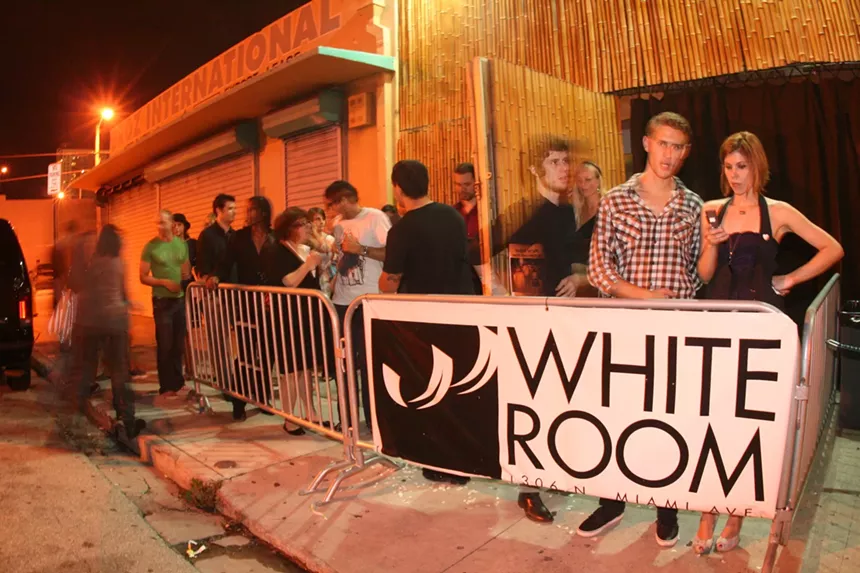Of the original four, only Lorie is on this Zoom call. Also present is Jake Jefferson, who joined the party crew in 2009. The two unfamiliar faces belong to Poplife CEO LP Steele and chief operating officer Tom Tromba. They joined when Poplife transitioned from the indie-dance party that hipster Gen Xers and millennials flocked to every Saturday to a marketing agency that works with big-name brands nationwide.
"As Poplife, we've always had brands coming to us, not in the formality of an agency but, like, 'Oh, you guys are doing cool shit. We want to be part of it,'" explains Lorie, whose title at the agency is simply founder. "We've always dabbled in that world, and then nine years ago, we did FM Festival at the North Beach Bandshell; it was our first big foray into working with a brand, which was Suntory."
That's also around the time Steele came into the fold. "Out of that experience, LP, Jake, and I started talking about building an agency that understood the culture on a real level, and I brought Tom to work with me on a special project," Lorie adds. "Everything was just sort of a collective of people in the industry, and we decided to come together and formalize it."

Poplife was one of several indie-dance parties that popped up in Miami at the turn of the century.
Poplife photo
Still Popping
So why keep the name Poplife? For one, it's a recognizable name. The team debated calling the agency something else but quickly discovered that thanks to the long-running party, some potential clients recognized the name."At first, the idea was to call it Poplife Collective," says Jefferson, Poplife's chief culture officer. "But then at some point, it was like, 'Hey, Poplife has a name; it does resonate with some people. Why not keep it under the original umbrella?' There definitely was a discussion because we are doing something different and are people going to get it."
"Being from the agency side, Poplife has come up in conversations with clients who go, 'I used to go to Poplife parties!'" Steele adds. "There was name recognition, but also the name is so great."
That isn't entirely unsurprising. Poplife was part of the collective of indie-dance and alternative parties that popped up around Miami clubs in the late '90s and early 2000s, including Revolver, SpiderPussy, and Back Door Bamby. Poplife also took over countless now-defunct venues like IO Lounge, Piccadilly Garden, Pawn Shop Lounge, Electric Pickle, and White Room. It also introduced Miami partygoers to acts like M.I.A., Diplo, and Calvin Harris long before they were famous. Poplife even had a hand in opening and operating the venue Grand Central.
However, the nightlife landscape in Miami today differs greatly from the one in which Poplife started. For starters, clubgoers used to go out for the party itself; nowadays, if you don't have a big name on the bill, you might be looking at an empty venue. Also, venues today are certainly more risk-averse at giving novice party promoters a chance to start and develop parties. And forget about trying to own and operate a venue of your own. Downtown and Wynwood used to resemble a bombed-out city, meaning rents were cheap, and the cost of opening a venue was much lower; now, you need millions in investments just to get started.

Poplife has worked with brands like Diesel, Adidas, Heineken, and 400 Conejos as an agency.
Poplife photo
Collective Wisdom
Switching focus from nightlife to marketing feels like a natural path for Poplife. For decades, it focused on shaping culture, and now it can impart that wisdom to its roster of clients."None of us like using the word 'culture,' actually. We've tried to redefine it, but we're like, 'Okay, we are just trying too hard. Culture is culture,'" Steele explains.
"We are not some guys at a desk reading about it; we grew up in it. I grew up playing in bands, DJing, being a promoter, owning clubs," Lorie adds.
"There are a lot of brands that misuse culture and think of culture as trends," Tromba says. "They go hand in hand, obviously, but culture is more than that. It's community, music, fashion, art, skateboarding." For Tromba, they are living in it versus latching onto something that they can sell to clients.
The quartet divides the responsibility, with Steele and Tromba determining brands' goals and Lorie and Jefferson using their extensive event-planning knowledge to execute their visions. They've worked with brands like Kraken Rum, Ally, Diesel, Adidas, Heineken, and 400 Conejos. Last year, they received recognition from the American Marketing Association for "Best Experiential Campaign."
Past and Present
The team is blending the old and new for Poplife's 25th-anniversary party at ZeyZey on Saturday, January 25. Partygoers will have a chance to relive the Poplife they know and love while also taking in what the agency can do through its collective decades of experiential marketing experience."I love that element of discovery, and I still love bringing people together to have a great time," Jefferson says. "We have a mix of new and old talent, and throwing a party together is kind of what we're good at."
"The foundation of the company is so much in music, but we are also so much more now," Steele explains. "You'll see as you come to the event that there are art installs, specialty food and cocktails, special guests and appearances, and unique branding moments we've done to showcase our experience as fabricational creatives. It's taking our music experience a step further in our new world."
Poplife 25th Anniversary. With Felix Da Housecast, Aramis Lorie, Ray Milian, Mike Deuce, and Jovigibs. 8 p.m. Saturday, January 25, at ZeyZey, 353 NE 61st St., Miami; poplife99.com. Tickets cost $25 to $75 via shotgun.live.










